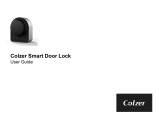
12 13
Press [3] to enter user deletion, then
press [4] to enter card deletion. Press [1]
to delete a single card and then press [*]
several times until you exit master mode.
3
4
Delete a card
1
Press [3] to enter user deletion, then press
[3] again to enter ngerprint deletion.
Press [2] to delete all ngerprints. After
hearing a voice prompt of "Succeeded",
press [*] several times until you exit
master mode.
3 3
Delete all ngerprints
2
Enter the 2-digit [user number] (00-99)
of the ngerprint that is to be deleted
and conrm with [#]. After hearing a
voice prompt of “Succeeded”, press [*]
several times until you exit master mode.
Press [3] to enter user deletion, then
press [3] again to enter ngerprint
deletion. Press [1] to enter single
nerprint deletion.
3 3
Press [#], enter master PIN code and
conrm with [#].
Delete a ngerprint
1
Press [3] to enter user deletion, then
press [4] to enter card deletion. Press [2]
to delete all cards. After hearing a voice
prompt of "Succeeded", press [*] several
times until you exit master mode.
3
4
Delete all cards
2
System date initialization
Remove the battery cover and double
press the [RES] button with a sharp
object, until you hear a voice prompt
of "Restored to factory settings". All
user information will be emptied.
Adjust the language as needed: For
Chinese, press [1]; for English, press
[2]. After hearing a voice prompt of
“Succeeded”, press [*] several times
until you exit master mode.
Press [4] to enter system settings, then
press [1] to enter language settings.
The default language is English.
The default volume is “higher volume”.
4
Language Settings
or
2
1
1
Adjust the volume as needed: For higher
volume, press [1]; for lower volume,
press [2]; for mute mode, press [3]. After
hearing a voice prompt of “Succeeded”,
press [*] several times until you exit
master mode.
Press [4] to enter system settings, then
press [2] to enter volume settings.
2
4
Volume settings
3
or or
2
1
or
2
1
Press [4] to enter system settings,
then press [3] to choose verication
method.
For single verication, press [1]; for dual
verication, press [2]. After hearing a
voice prompt of “Succeeded”, press
[*] several times until you exit master
mode.
4
Switch to dual verication mode
3
Press [#], enter master PIN code and
conrm with [#].
Press [#], enter master PIN code and
conrm with [#].
Press [#], enter master PIN code and
conrm with [#].
Press [#], enter master PIN code and
conrm with [#].
Press [#], enter master PIN code and
conrm with [#].
Press [#], enter master PIN code and
conrm with [#].
Press [#], enter master PIN code and
conrm with [#].
Press [3] to enter user deletion, then
press [2] to enter one-time user PIN code
deletion.
After hearing a voice prompt of
“Succeeded”, press [*] several times until
you exit master mode.
3
Delete a one-time user PIN code
2
System Settings
Attention
Attention

















